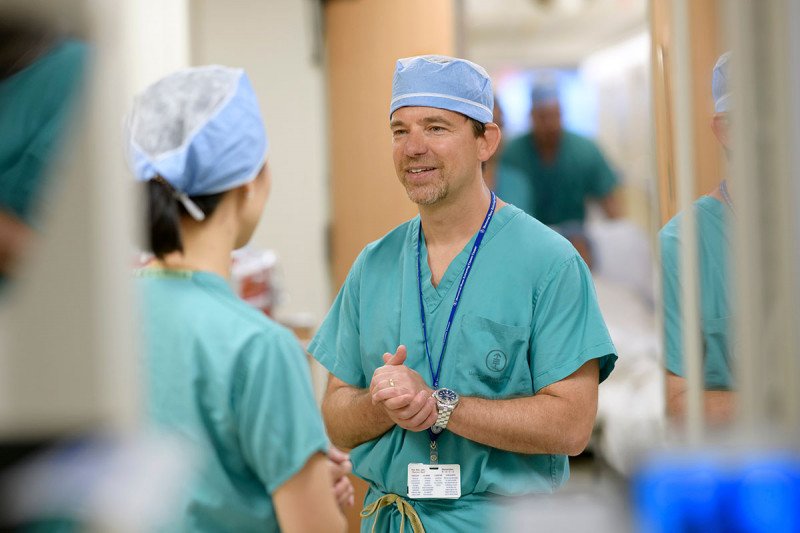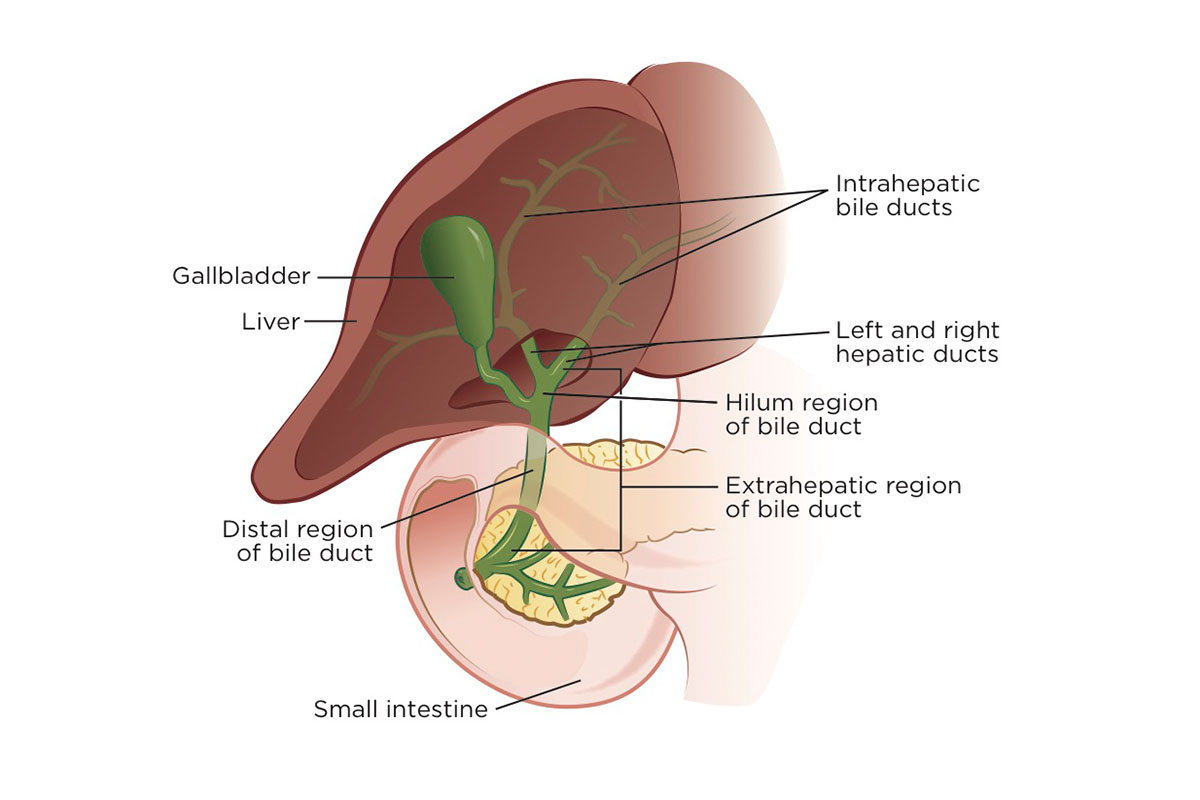
This information is about bile duct cancer.
If you or someone you care about has been diagnosed with bile duct cancer, you may have a lot of questions. Where should you go for care? What are your treatment options? How can you keep your quality of life?
This guide is a good place to begin finding answers. From here, you can visit other sections of our bile duct cancer guide for more in-depth information. The information in this guide relates only to bile duct cancer. There are many similarities between bile duct cancer and gallbladder cancer. Read more about gallbladder cancer.
- What is bile duct cancer?
- What are the symptoms of bile duct cancer?
- What are the types of bile duct cancer?
- What are the risk factors for bile duct cancer?
- How is bile duct cancer diagnosed?
- What are the treatments for bile duct cancer?
- Why should I choose Memorial Sloan Kettering for bile duct cancer treatment?
What is bile duct cancer?
Bile duct cancer is also called cholangiocarcinoma. It is a rare disease that begins in the bile ducts. These are thin tubes that carry bile, a digestive fluid, between the liver, bile ducts, and small intestine.
What are the symptoms of bile duct cancer?
Bile duct cancer usually doesn’t cause symptoms until it reaches an advanced stage and has spread to other organs and tissues. But some people may notice early symptoms. These can include the yellowing of the skin and the whites of the eyes (jaundice), itchy skin, light-colored stool, pain or bloating in the belly, nausea and vomiting, loss of appetite or unexplained weight loss, fever, and fatigue. These symptoms are often caused by something other than bile duct cancer.
Learn more about the symptoms of bile duct cancer.
What are the types of bile duct cancer?

Most primary bile duct cancer is adenocarcinoma. This growth begins in the mucus glands that line the insides of the bile ducts. These tumors can occur in the main bile duct outside the liver (extrahepatic) or within the liver (intrahepatic).
Learn more about the types of bile duct cancer.
What are the risk factors for bile duct cancer?
People who have chronic (long-standing) inflammation of the bile ducts have an increased risk of developing bile duct cancer. Inflammation conditions include a disease called primary sclerosing cholangitis and chronic liver disease. Other risk factors include age (50 and above), obesity, and diabetes.
Learn more about the risk factors for bile duct cancer.
How is bile duct cancer diagnosed?
Bile duct cancer is usually not detected until a person becomes jaundiced. It may be found if a test shows abnormal liver function. Sometimes bile duct cancer is identified when a CT scan is done for another reason. To accurately diagnose and stage bile duct cancer, doctors may use blood tests, imaging tests, biopsy, or a combination of these methods.
Learn more about how bile duct cancer is diagnosed.
What are the treatments for bile duct cancer?
Surgery is the preferred treatment for bile duct cancer that has not spread. This may involve removing only the bile duct and surrounding lymph nodes. For some people, more-extensive surgery is necessary. We may use other treatments, such as radiation or chemotherapy, in addition to surgery or for people who cannot have surgery.
Learn more about the treatments for bile duct cancer.
Why should I choose Memorial Sloan Kettering for bile duct cancer treatment?
Memorial Sloan Kettering’s bile duct cancer experts deliver the highest quality, compassionate cancer care. We consider each individual’s needs and develop a personalized treatment plan for every person.
At MSK, we offer:
- A multidisciplinary team of experts who are highly experienced in the treatment of bile duct cancer. This includes world-class specialists in surgery, chemotherapy, radiology, pathology, nursing, and social work.
- Close collaboration among these experts. Members of our bile duct cancer team meet regularly to discuss the treatment of the people we care for. We bring a variety of clinical perspectives to develop individualized care plans for each patient.
- Highly skilled surgeons who have extensive experience in removing bile duct tumors.
- Medical oncologists with vast experience in giving chemotherapy to people with bile duct cancer. We carefully tailor treatments to be as effective as possible while minimizing side effects.
- Radiation oncologists who use advanced techniques to treat bile duct tumors that cannot be removed by surgery. We also use radiation to shrink tumors before surgery or, after surgery, to treat the area where the tumor once was to prevent the cancer from returning.
- A dedicated team of nurses who specialize in caring for people with bile duct cancer while they are in the hospital as well as during outpatient visits. Each nurse works with a primary doctor to oversee every patient’s care.
- Minimally invasive symptom relief for people who are not candidates for surgery. These procedures can relieve such symptoms as pain, nausea, and infection.
- Access to clinical trials investigating new and improved treatments for bile duct cancer. Sometimes these studies offer therapies years before they are available anywhere else.
- A comprehensive program to support the physical, emotional, and spiritual needs of people with bile duct cancer during and after treatment.
- Flexibility in how and where to receive treatment. Our specialists are conveniently located in New York City and at our regional outpatient locations in New York State and New Jersey. This provides our patients with the same outstanding care from MSK doctors but closer to home. See all MSK locations.
We’re available 24 hours a day, 7 days a week

